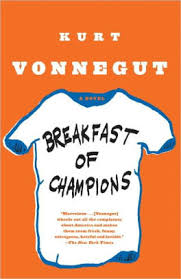 “She taught us to be impolite in conversation not only about sexual matters, but about American and famous heroes, about the distribution of wealth, about school, about everything.” And maybe that’s just what is missing from school. Maybe that’s what is missing from our kids’ education. They should forget about so much nonsense at school, quit filling the kids’ teaching days with entrepreneurship and business and money-making activities and teach them to be honest. To be frank. To go straight to the point. To query about everything and not letting anyone dictate them what they can say/think and what not. And, if anything is not right, allow them to say it out loud regardless of its lack of political correctness… but of course, it is far easier to train the kids at being power-amassing machines (i.e. money) instead of trying to make them human beings. Plus nobody wants it. If you don’t believe me, just read any kid’s syllabus. Yes, the one ruled out by the government, the one teachers must follow regardless. And if you find in it any attention to the most humanistic aspects, please let me know.
“She taught us to be impolite in conversation not only about sexual matters, but about American and famous heroes, about the distribution of wealth, about school, about everything.” And maybe that’s just what is missing from school. Maybe that’s what is missing from our kids’ education. They should forget about so much nonsense at school, quit filling the kids’ teaching days with entrepreneurship and business and money-making activities and teach them to be honest. To be frank. To go straight to the point. To query about everything and not letting anyone dictate them what they can say/think and what not. And, if anything is not right, allow them to say it out loud regardless of its lack of political correctness… but of course, it is far easier to train the kids at being power-amassing machines (i.e. money) instead of trying to make them human beings. Plus nobody wants it. If you don’t believe me, just read any kid’s syllabus. Yes, the one ruled out by the government, the one teachers must follow regardless. And if you find in it any attention to the most humanistic aspects, please let me know.
“The things other people have put into my head, at any rate, do not fit together nicely, are often useless and ugly, are out of proportion with one another, are out of proportion with life as it really is outside my head.”
“This book is a sidewalk strewn with junk, trash which I throw over my shoulders as I travel in time back to November eleventh, nineteen hundred and twenty-two.”
Welcome to a country where men are bursting with questions, where the national flag can’t reach the floor, where the national motif is in ancient greek even though nobody speaks or understands it, where there is an inverted pyramid with a glowing eye on top printed on the bank notes, where people are told that life began in 1492 when, as a matter of fact, “that was simply the year in which sea pirates began to cheat and rob and kill them.” Yes, welcome to a country as absurd as ours.
There is a quality in the small things (stupid for so many people, thrilling by others) that fascinates me. David Foster Wallace was a genius showing them. Vonnegut is also proving good at it: “Sparky could no wag his tail -because of an automobile accident many years ago, so he had no way of telling other dogs how friendly he was.” And this kind of small things touch me. And I don’t care whether the feeling is shared or not.
“He looked so much like a Chinaman that he had taken to dressing like a Chinaman.”
Sometimes the interesting point of some dystopias like this one is that they show you real things, tangible, present things, and they explain them to you as if they were brand new. In here, Vonnegut does it with almost everything because, as he states towards the end of the book, his intention with writing this book was that every single character in it and every single thing were equally important. And that means proper contextualisation of everything. So, he explains us the USA, the name of some well-known brands, the meaning of some swearing words, the normal size of penises, vaginas… and he does it in a cold, medical, descriptive manner: “excuse me I have to take a leak. This was a way of saying that the speaker intended to drain liquid wastes from his body through a valve in his lower abdomen.” Plus he adds pencil drawings to add up to the joke. And they certainly do.
“Almost all the messages which were sent and received in his country, even the telepathic ones, had to do with buying or selling some damn thing.” And if we should add cat videos, corny power points and fake news, we would have practically the totality of nowadays digital communication.
“I had given him a life not worth living, but I had also given him an iron will to live. This was a common combination on the planet Earth.” Exactly, the damned combination of an unsuccessful, unnecessary, unsatisfying life with the obligation of having to live it out no matter what.
“The planet was being destroyed by manufacturing processes, and what was being manufactured was lousy, by and large.”
“In the interest of survival, they trained themselves to be agreeing machines instead of thinking machines. All their minds had to do was to discover what other people were thinking, and then they thought that, too.” And in here he is only talking about women but it is pretty obvious that it is not a one-gender thing but, unfortunately, a global disease that tends to be combined with hypocrisy and the thirst to grow socially and economically.
“Fascism was a fairly popular political philosophy which made sacred whatever nation and race the philosopher happened to belong to.”
“I had come to the Arts Festival incognito” tells us the author himself from the book. “I was there to watch the confrontation between two human beings I had created.” And the dialogue between the real Unamuno and the Unamuno character in Niebla comes to mind. And so do Kundera’s. And this constant presence of the author in the book is, maybe, one of its key points. The constant explanations, off-character and off-fiction that fill the pages with sweet irony.
“As I approached my fiftieth birthday, I had become more and more enraged and mystified by the idiot decisions made by my countrymen. And then I had come suddenly to pity them, for I understood how innocent and natural it was for them to behave so abominably, and with such abominable results: they were doing their best to live like people invented in story books. This was the reason Americans shot each other so often: it was a convenient literary deice for ending short stories and books.” And it is frightening how close to reality it actually is. And Vonnegut adds: “Why were so many Americans treated by their government as though their lives were as disposable as paper facial tissues? Because that was the way authors customarily treated bit-part players in their made-up tales.” And what solution does Vonnegut give to this fake reality that our lives have become? “Once I understand what was making America such a dangerous, unhappy nation of people who had nothing to do with real life, I resolved to shun storytelling. I would write about life. Every person would be exactly as important as any other.” Any action as important as the next one. Of course this would bring chaos and confusion but “let others bring order to chaos. I would bring chaos to order.” And maybe, following Vonnegut’s train of thoughts, we would see that “there is no order in the world around us, that we must adapt ourselves to the requirements of chaos instead.”
“Most of the conversation in the country consisted of lines from television shows, both present and past.”
But why does Vonnegut decide to step into this novel? Because (following his own answer) just like Tolstoi freed his servants when he turned 50 and so did Thomas Jefferson with his slaves, Vonnegut wants to “set at liberty all the literary characters who have served me so loyally during my writing career.” And what bigger redemption is there than this one? To get free from the ghosts (even though self-generated) that have been chasing us all our life.
_____________________
Kurt Vonnegut, Breakfast of Champions (Penguin)
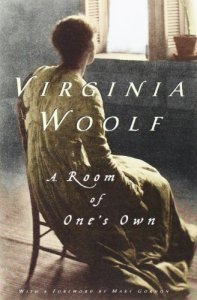 After being asked to present a lecture on Women and Literature, Virginia Woolf said that she could talk about Auster, Brönte, and so on, but that wouldn’t be enough. There are always pendint topics. We need more than just a few names to understand the relationship between women and literature. Therefore, she decided to show the path she’s followed in order to attain a sort of conclusion on this theme (“a woman must have money and a room of her own if she is to write fiction“) and also point out all the prejudices and false ideas that led her to this conclusion so the audience can decide whether she is right or wrong.
After being asked to present a lecture on Women and Literature, Virginia Woolf said that she could talk about Auster, Brönte, and so on, but that wouldn’t be enough. There are always pendint topics. We need more than just a few names to understand the relationship between women and literature. Therefore, she decided to show the path she’s followed in order to attain a sort of conclusion on this theme (“a woman must have money and a room of her own if she is to write fiction“) and also point out all the prejudices and false ideas that led her to this conclusion so the audience can decide whether she is right or wrong.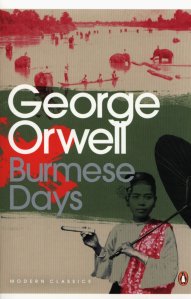 “No European cares anything about proofs. When a man has a black face, suspicion IS proof.” States U Po Kyin, the arguably respectable lawyer who has managed to earn himself a social position through bribery, blackmailing and multiple debauchery.
“No European cares anything about proofs. When a man has a black face, suspicion IS proof.” States U Po Kyin, the arguably respectable lawyer who has managed to earn himself a social position through bribery, blackmailing and multiple debauchery. Second play of the famous trilogy formed by Thunderstorm, Sunrise and The Wilderness, considered one of the classic trilogies on modern Chinese theatre. In this occasion, Cao Yu tells us the story of Chen Bailu, an educated country girl who has fallen into a downward spiral of corruption and depravation in the city.
Second play of the famous trilogy formed by Thunderstorm, Sunrise and The Wilderness, considered one of the classic trilogies on modern Chinese theatre. In this occasion, Cao Yu tells us the story of Chen Bailu, an educated country girl who has fallen into a downward spiral of corruption and depravation in the city.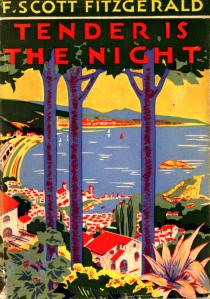 John Updike’s
John Updike’s  The curious and yet worrying image of a vast amount of station wagons packed to the top with all the items money can buy (the necessary ones and the others), open the book. With just the one page, we see the exaggeration of capitalism, the unnecessary accumulation of more and more items done by a new generation that only now begins to emancipate. And, next to them, their parents. “This assembly of station wagons, as much as anything they might do in the course of the year, more than formal liturgies or laws, tells the parents they are a collection of the like-minded and the spiritually akin, a people, a nation.” Crowded in the street in front of the university, dropping off their kids into the university residences, all the parents become one.
The curious and yet worrying image of a vast amount of station wagons packed to the top with all the items money can buy (the necessary ones and the others), open the book. With just the one page, we see the exaggeration of capitalism, the unnecessary accumulation of more and more items done by a new generation that only now begins to emancipate. And, next to them, their parents. “This assembly of station wagons, as much as anything they might do in the course of the year, more than formal liturgies or laws, tells the parents they are a collection of the like-minded and the spiritually akin, a people, a nation.” Crowded in the street in front of the university, dropping off their kids into the university residences, all the parents become one. “How weary, stale, flat, and unprofitable seemes to me all the uses of this world” complains a melancholic Hamlet in one of his first speeches. After the king reproached his elongated mourning for his father’s death, Hamlet feels more hurt and, mainly, lost facing the existentialist question: what’s the meaning of it all? Sartre mentions a nausea before telling us that, at the very end, it all simply finishes. Heidegger faces us to the raw ending to make us realise that that must be our force to keep on living. Cioran claimed that “We do not run towards death; we flee from the catastrophe of birth.”* And the religious people stick to after lives, lives beyond this one which, apparently, would be much better than this one (not too difficult to imagine) and through which everything will become meaningful. You can match and choose. Everyone can decide his/her own option.. But please, do not impose it upon everybody else.
“How weary, stale, flat, and unprofitable seemes to me all the uses of this world” complains a melancholic Hamlet in one of his first speeches. After the king reproached his elongated mourning for his father’s death, Hamlet feels more hurt and, mainly, lost facing the existentialist question: what’s the meaning of it all? Sartre mentions a nausea before telling us that, at the very end, it all simply finishes. Heidegger faces us to the raw ending to make us realise that that must be our force to keep on living. Cioran claimed that “We do not run towards death; we flee from the catastrophe of birth.”* And the religious people stick to after lives, lives beyond this one which, apparently, would be much better than this one (not too difficult to imagine) and through which everything will become meaningful. You can match and choose. Everyone can decide his/her own option.. But please, do not impose it upon everybody else.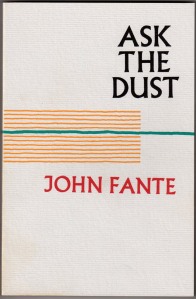 Who is the great Arturo Bandini? How come have you never heard about him? Maybe because he is a failure, a blocked, bankrupted author who only managed to publish a short story and barely survives in a decayed hotel thanks to the few pennies he gets from his mother. A damned writer facing the struggle of the artist who has to decide whether to live to have new experiences to write about or being incapable to write. A man who dreams about fooling around with women just to be able to write about love but who doesn’t even manage to get intimate with prostitutes. A failed man who dreams about all what the world is missing from not knowing him, everything he’ll achieve once he is discovered, all that he will become once he gets back to writing. If he ever regains inspiration. A loser alike to Bukowski’s alter ego Hank. No wonder Bukowski wrote the prologue to this edition where he confesses the strong influence Fante´s work had on his own writing. And who is Fante? How come have you never heard about him? Well, maybe because of the same reason I had not: because no one talks about him. Because even though he is well known and appreciated amongst certain circles of literary connoisseurs, his name hardly ever reaches a wider audience. We seem to be too concerned with temporary hypes, with media-famous writers, that we pay no attention to real writers.
Who is the great Arturo Bandini? How come have you never heard about him? Maybe because he is a failure, a blocked, bankrupted author who only managed to publish a short story and barely survives in a decayed hotel thanks to the few pennies he gets from his mother. A damned writer facing the struggle of the artist who has to decide whether to live to have new experiences to write about or being incapable to write. A man who dreams about fooling around with women just to be able to write about love but who doesn’t even manage to get intimate with prostitutes. A failed man who dreams about all what the world is missing from not knowing him, everything he’ll achieve once he is discovered, all that he will become once he gets back to writing. If he ever regains inspiration. A loser alike to Bukowski’s alter ego Hank. No wonder Bukowski wrote the prologue to this edition where he confesses the strong influence Fante´s work had on his own writing. And who is Fante? How come have you never heard about him? Well, maybe because of the same reason I had not: because no one talks about him. Because even though he is well known and appreciated amongst certain circles of literary connoisseurs, his name hardly ever reaches a wider audience. We seem to be too concerned with temporary hypes, with media-famous writers, that we pay no attention to real writers. The apparent racial integration in the major cities turns out to be, too often, a lazy indifference towards each other. A racial and circumstantial invisibility that allows us to live together yet keeping us apart. A matter of accepting the new-comers as long as they are far away from us and don’t interfere with our lives. In here, Ifemelu, the main character, shows it all quite well from the beginning: she lives in a white part of the city thanks to her relationships with white men, she doesn’t have problems with anyone because she works and has money but when it comes to having an African hairdo, when she wants to do something remotely linked to her culture and tradition, she has to take a train and go the the black side of the city. It would be unacceptable that someone dared to open an African hairdresser in the centre of an American city! Integrated, yes, but nicely segregated.
The apparent racial integration in the major cities turns out to be, too often, a lazy indifference towards each other. A racial and circumstantial invisibility that allows us to live together yet keeping us apart. A matter of accepting the new-comers as long as they are far away from us and don’t interfere with our lives. In here, Ifemelu, the main character, shows it all quite well from the beginning: she lives in a white part of the city thanks to her relationships with white men, she doesn’t have problems with anyone because she works and has money but when it comes to having an African hairdo, when she wants to do something remotely linked to her culture and tradition, she has to take a train and go the the black side of the city. It would be unacceptable that someone dared to open an African hairdresser in the centre of an American city! Integrated, yes, but nicely segregated.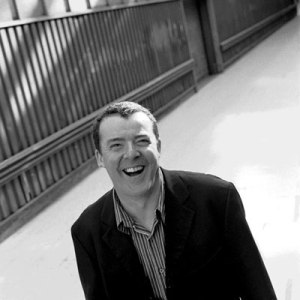 Joyce McMillan wrote in The Guardian that “Elizabeth Gordon Quinn is clearly a monster of snobbery and false consciousness, pathetically deluded about her own life, denying her working-class neighbours the solidarity they need.” A touch of sink drama but with a main character unable (or rather, unwilling) to take part in it.
Joyce McMillan wrote in The Guardian that “Elizabeth Gordon Quinn is clearly a monster of snobbery and false consciousness, pathetically deluded about her own life, denying her working-class neighbours the solidarity they need.” A touch of sink drama but with a main character unable (or rather, unwilling) to take part in it.